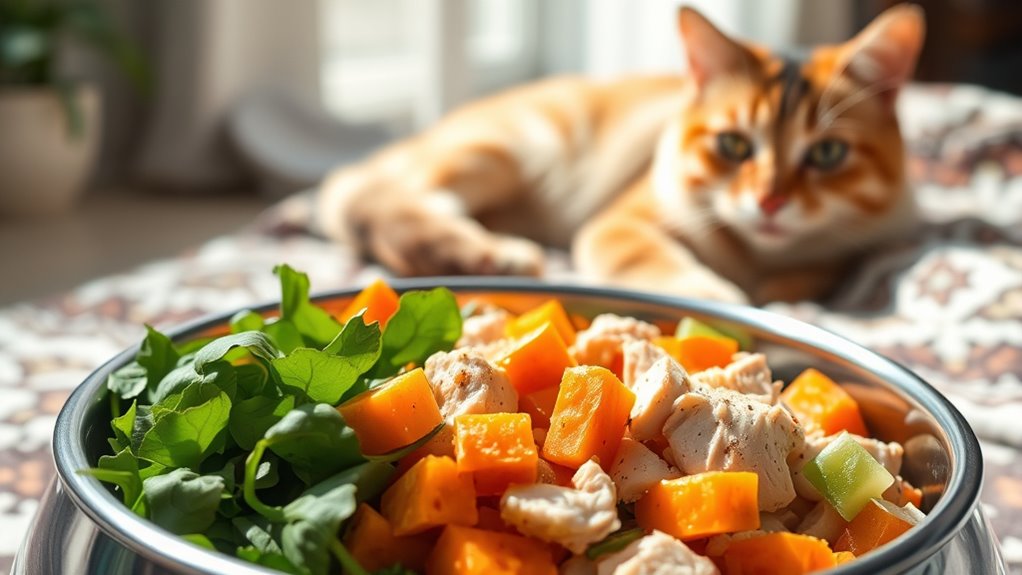Personalized pet nutrition means customizing your pet’s diet to fit their specific needs based on age, breed, activity level, and health. By focusing on a raw diet, you control ingredients, ensuring your pet gets fresh, minimally processed foods that support digestion, coat, and immunity. Adjusting their meals over time helps keep them healthy and happy. If you want to discover how to craft the perfect diet for your pet, there’s much more to explore.
Key Takeaways
- Assess your pet’s age, breed, activity level, and health conditions to determine specific nutritional needs.
- Choose a raw diet with fresh, minimally processed ingredients to mimic natural eating habits and improve overall health.
- Balance nutrients by selecting appropriate protein, fats, vitamins, and minerals, considering your pet’s individual requirements.
- Regularly monitor your pet’s health and adjust the diet as needed to ensure optimal wellness and address changing needs.
- Consult with a veterinarian or pet nutritionist to craft a personalized, balanced diet plan tailored to your pet’s unique lifestyle.

Have you ever wondered if your pet’s diet could be tailored just for them? Personalizing your pet’s nutrition isn’t just a trend—it’s a way to guarantee they thrive. Every animal has unique needs based on age, breed, activity level, and health conditions. By focusing on a raw diet, you can provide fresh, minimally processed foods that closely mimic what they’d eat in the wild. This approach allows you to have more control over the ingredients and avoid fillers or artificial additives often found in commercial kibble. But simply switching to a raw diet isn’t enough; you need to prioritize nutrient balance to meet your pet’s specific requirements. That means offering a mix of proteins, fats, and carbs in proportions that support their overall health, energy levels, and immune function.
To do this effectively, you should start by understanding your pet’s individual needs. For instance, a highly active dog may require more protein and fat to sustain their energy, while an older cat might benefit from a diet richer in certain nutrients to support joint health and cognitive function. Achieving the right nutrient balance involves carefully selecting ingredients that complement each other. Fresh meats, organs, and bones can provide essential minerals and amino acids, but supplementing with vegetables or specific nutrients might be necessary to cover all bases. Consulting with a veterinarian or pet nutritionist can help you create a balanced plan that aligns with your pet’s health targets. This personalized approach guarantees they’re not just eating more natural foods but getting the right amounts of everything they need to stay healthy.
Switching to a raw diet with a focus on nutrient balance may seem intimidating at first, but it offers significant benefits. When your pet’s diet is tailored specifically for them, you’re supporting their digestion, improving coat quality, and reducing the risk of certain illnesses. It also empowers you to be proactive about their wellness, rather than reacting to health issues down the line. Keep in mind, though, that a personalized diet isn’t about overcomplicating things; it’s about making smarter, more informed choices. Regular monitoring and adjustments will help you refine their diet over time, ensuring they get ideal nutrition at every stage of life. With dedication and knowledge, you can craft a diet that’s as unique as your pet, giving them the best chance to live a happy, healthy life. Additionally, understanding nutrient balance can help you better tailor their meals to meet their evolving health needs.
Frequently Asked Questions
How Often Should I Update My Pet’s Diet Plan?
You should update your pet’s diet plan every 6 to 12 months, or whenever there’s a significant change in their health, weight, or activity level. Keep an eye on their feeding frequency and adjust portion sizes as needed to maintain diet consistency. Regular check-ins with your vet guarantee your pet’s nutrition stays balanced and tailored to their evolving needs, helping them stay healthy and happy.
Are There Risks to Switching My Pet’s Diet Frequently?
Switching your pet’s diet frequently can disrupt diet stability and risk nutritional imbalance. Constant changes may cause digestive issues or deficiencies if not managed carefully. To keep your pet healthy, introduce new foods gradually and consult your vet. This approach helps maintain nutritional balance and ensures your pet adapts smoothly, avoiding the potential health risks associated with frequent diet alterations. Always prioritize consistency and professional guidance for your pet’s well-being.
Can Personalized Diets Prevent Certain Health Issues?
Yes, personalized diets can help prevent certain health issues by addressing your pet’s specific needs. By targeting nutritional deficiencies and dietary sensitivities, you lessen the risk of problems like allergies, obesity, or digestive issues. Customizing your pet’s diet guarantees they get the right nutrients, supporting overall health and longevity. This proactive approach helps catch and prevent potential health concerns before they become serious, keeping your pet happier and healthier long-term.
How Do I Know if My Pet Has Specific Dietary Needs?
Like a detective searching for clues, you observe your pet closely. Watch for signs of allergies, such as itching, redness, or ear infections. Notice if they show signs of nutritional deficiencies like lethargy, poor coat, or weight loss. If these symptoms appear, it’s time to consult your vet. They can help determine if your pet has specific dietary needs, ensuring they get the right nutrients for ideal health.
What Are the Costs Associated With Personalized Pet Nutrition?
The costs of personalized pet nutrition vary depending on the provider and your pet’s specific needs. You should consider a cost analysis that includes subscription fees for regular deliveries and tailored diet plans. While these services might be more expensive than standard pet food, they often provide better health benefits. Be sure to compare options, ask about hidden fees, and determine if the investment aligns with your budget and your pet’s well-being.
Conclusion
By embracing personalized pet nutrition, you can provide your pet with perfect, tailored treats that boost their health and happiness. Remember, customizing diets creates caring connections and confident canines and cats. Prioritize their unique needs, preferences, and potential sensitivities to foster a flourishing, food-friendly future. With thoughtful, tailored feeding, you’re not just nourishing your pet—you’re nurturing a lifelong bond built on love, loyalty, and lively, lively health.









